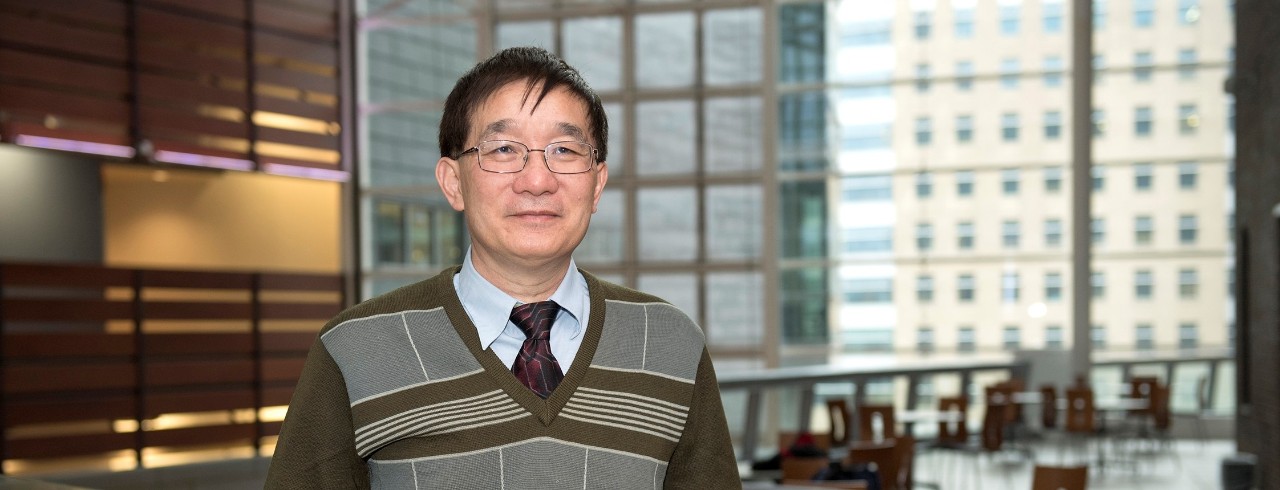
NIH funds UC study on HIV medicines
UC scientist leads research to determine tolerance of HIV medications
University of Cincinnati pharmaceutical sciences researcher Bingfang Yan, DVM, has received a $443,000 grant from the National Institutes of Health to study how common medicines against viral infections are genetically impacted for therapeutic effectiveness and safety through metabolic conversions in the body.
The two medicines being studied are antiviral drugs: tenofovir disoproxil fumarate (TDF) and tenofovir alafenamide fumarate (TAF). The former has been listed as an essential medicine for over a decade by the World Health Organization, and the latter is a newer version.
“Both drugs are very popular HIV medicines and also used to treat hepatitis B viral infection. They are prodrugs and require metabolism to be effective,” says Yan, a professor and researcher at UC’s James L. Winkle College of Pharmacy. A prodrug is a medication or compound that, after administration, is metabolized into a pharmacologically active drug. Instead of administering a drug directly, a corresponding prodrug can be used to improve how the drug is absorbed, distributed and metabolized.
“They are generally well tolerated but have been associated with organ toxicity such as development of fatty liver in some patients,” he says.
Yan points out that AIDS-related death among HIV patients has decreased in recent years, but liver disease-related death among these patients is on the rise at an alarming rate. The safety of these drugs is increasingly causing concerns, he says.
This research is a prime example of the impact UC makes on the health of global citizens and is part of the university’s strategic direction, Next Lives Here.
The NIH-funded project will analyze hundreds of human tissue samples to determine whether there is a genetic predisposition to developing the side effect in the liver or whether dosing may be at issue, since both medicines come in fixed doses.
“When we do metabolic analysis of these drugs with human tissues in combination with genotyping we can see if certain people should not use the drug or use it at a different dose,” says Yan.
Yan’s laboratory has exhibited strong expertise in diverse research areas, particularly in drug metabolism. Several milestone findings from his laboratory have gained global attention and been reported by public and professional media outlets. For decades, Yan’s laboratory has been supported by NIH. primarily through the R01 mechanism.
Yan frequently serves on scientific review panels for the NIH and U.S. Environmental Protection Agency and is a contributor to the six-volume “Encyclopedia of Drug Metabolism and Interactions.” This reference book is the result of a global effort, featuring prominent authors from 11 different countries.
Featured image at top of Bingfang Yan in the CARE/Crawley building on UC's medical campus. Photo/Colleen Kelley/UC Content + Creative
Impact Lives Here
The University of Cincinnati is leading public urban universities into a new era of innovation and impact. Our faculty, staff and students are saving lives, changing outcomes and bending the future in our city's direction. Next Lives Here.
Related Stories
It’s a mindset: Meet the visionaries redefining innovation at...
December 20, 2024
Innovation is being redefined by enterprising individuals at UC’s 1819 Innovation Hub. Meet the forward thinkers crafting the future of innovation from the heart of Cincinnati.
UC students well represented in this year’s Inno Under 25 class
December 20, 2024
Entrepreneurialism runs through the veins of University of Cincinnati students, as confirmed by the school’s strong representation in this year’s Inno Under 25 class.
UC professor Ephraim Gutmark elected to National Academy of...
December 20, 2024
Ephraim Gutmark, distinguished professor of aerospace engineering at the University of Cincinnati, was elected to the 2024 class of the prestigious National Academy of Inventors.
